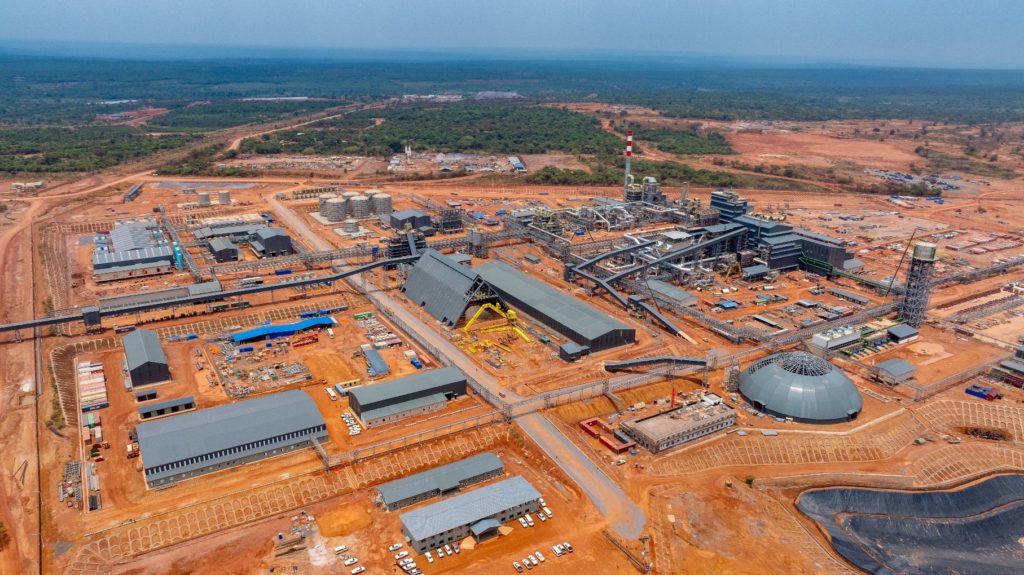
Following the installation of an additional 72 MW of generators, the on-site backup power capacity of 135 MW is now sufficient to power Kamoa-Kakula’s Phase 1 and 2 concentrators at full capacity, Ivanhoe said, adding that the project team remains on schedule to have 201 MW of installed on-site backup power generation capacity by year-end.
New copper guidance
For the year, Ivanhoe now expects its copper concentrate production to sit between 425,000-450,000 tonnes instead of 440,000-490,000 tonnes. Through the first three quarters, Kamoa-Kakula has produced 303,328 tonnes of copper in concentrate, including 40,025 tonnes at a record daily production rate of 1,334 tonnes during the month of September.
During the third quarter, the Phase 1 and 2 concentrators milled approximately 2.2 million tonnes of ore at an average feed grade of 4.9% copper. Quarterly copper production from the concentrators totalled 94,214 tonnes, at an average recovery rate of 86.6%.
The Phase 3 concentrator, which achieved commercial production during the third quarter, milled approximately 1.1 million tonnes of ore predominantly from historical surface stockpiles at an average feed grade of 2.6% copper. The concentrator added 22,099 tonnes of quarterly production at a recovery rate of 79.9%, reflecting the ongoing ramp-up.
Ivanhoe noted the Phase 3 concentrator sustained improvements in processing throughput and recovery rates following the commissioning of the fine-grinding mills in early September. During the last week of the month, the concentrator milled 117,484 tonnes, which is equivalent to an annualized processing rate of over 5.5 million tonnes per annum.
Kamoa’s operations team now expects to reach the nameplate recovery rate of 86% during the fourth quarter, thereby achieving steady-state production. In addition, the team is also targeting to increase the feed grade to the Phase 3 concentrator up to approximately 3% by the first quarter of 2025, while ore reserves continue to be developed towards the higher-grade zones in the Kamoa 1 and Kamoa 2 underground mines.
Zinc target revised
In addition to copper, Ivanhoe has readjusted its 2024 zinc guidance due to operational disruptions that have inhibited the nameplate throughput from being sustained on a daily basis at the Kipushi mine, also located in the DRC.
Since its first concentrate production this June, the Kipushi’s concentrator has continued to ramp up, with approximately 88,000 tonnes of stockpile ore milled during the third quarter at an average feed grade of 27.1% zinc. Quarterly zinc production from the concentrator was 17,817 tonnes, at an average flotation recovery rate of 72%. Exports of zinc concentrate also commenced towards the end of the quarter.
However, the ramp-up of Kipushi’s concentrator to its annual steady-state production rate of over 250,000 tonnes has been slower than anticipated. The company attributes this to three factors: higher iron content of the Big Zinc orebody, which was negatively impacting concentrator recoveries; ore feed into the dense media separation (DMS) circuit containing more fine material, which limited throughput; and the increase in power requirement, from 5 MW used during construction to 18 MW for operations.
As a result of these disruptions, the full-year production guidance range for Kipushi has been halved, from 100,000-140,000 tonnes of zinc in concentrate to 50,000-70,000 tonnes. Work is underway is to improve the recoveries and upgrade the mine infrastructure.
Meanwhile, Ivanhoe is implementing a debottlenecking program that is targeting a 20% increase in concentrator processing capacity to 960,000 tonnes of ore per annum. The program is expected to be completed in mid-2025.
Ivanhoe Mines’ shares fell 3.5% to C$19.79 apiece by 3 p.m. in Toronto on the Q3 results news release. The company has a market capitalization of C$26.8 billion.




